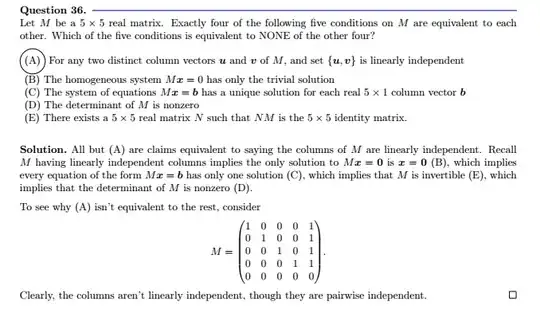Here is a question in GRE subject exam 0568 with its solution, I want to understand why the author said in the solution that "Recall
M having linearly independent columns implies the only solution to Mx = 0 is x = 0", could anyone explain this for me, is there a theorem that said this? if so could anyone tell me a book that contains this theorem with its proof ? as I am confused with the theorem given in the following picture , thanks in advance.
, thanks in advance. 
Asked
Active
Viewed 677 times
-1
-
https://math.stackexchange.com/questions/6734/gre-linear-algebra-question?rq=1 I found a discussion on this question here ..... it may help someone in the future. – Jun 21 '17 at 10:09
-
3Any book in linear algebra. Try Lang's – Francesco Polizzi Jun 21 '17 at 10:12
-
1What theorems? The solution gives outlines of proofs for the statements. If it is a reference you want, you can choose any Linear Algebra book. – Bobson Dugnutt Jun 21 '17 at 10:14
-
@FrancescoPolizzi could u please tell me exactly the name of the book and its author? thanks in advance. – Jun 21 '17 at 10:44
-
1Serge Lang, Linear Algebra – Francesco Polizzi Jun 21 '17 at 11:20
1 Answers
1
Write $M = (v_1,\dots,v_n)$ in terms of its columns. Then $M(x_1,\dots,x_n)^T = x_1v_1 + \dots + x_nv_n$. Saying $Mx$ has no non-zero solution is exactly saying that $v_1,\dots,v_n$ are linearly independent.
If $Mx = Mx'$ and $x \ne x'$ then $M(x - x') = 0$ and $x - x' \ne 0$.
If $Mx = 0$ has no non-zero solutions then $\ker M = \{0\}$ so $\operatorname{im} M = 5$ by Rank-Nullity. Thus $M$ is injective and surjective and hence invertible.
If $M$ is invertible then $\det M \det M^{-1} = \det I = 1$ so $\det M \ne 0$.
If any of this was confusing to you then you should probably go back to a textbook. These one-off answers, I think, won't be much help in comparison.
Trevor Gunn
- 27,041
-
1See https://math.stackexchange.com/questions/160056/what-is-a-good-book-to-study-linear-algebra. – Trevor Gunn Jun 21 '17 at 13:44
-
"Saying Mx has a non-zero solution is exactly saying that v1,…,vn are linearly independent" I think you mean linearly dependent instead of linearly independent? – Jun 21 '17 at 14:09
-
1@Idonotknow I meant to say "no non-zero solutions" but your correction would also work. – Trevor Gunn Jun 21 '17 at 14:12